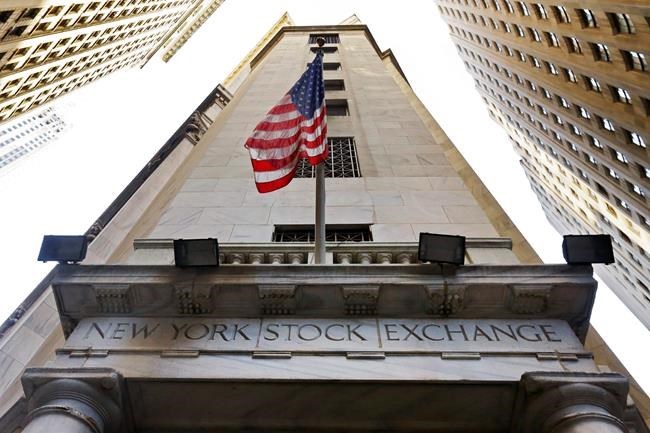
FILE - In this Friday, Nov. 13, 2015, file photo, the American flag flies above the Wall Street entrance to the New York Stock Exchange. U.S. stocks are mixed, Wednesday, Oct. 11, 2017, as household goods and health care companies move higher and banks and energy companies decline. (AP Photo/Richard Drew, File)
Republished October 11, 2017 - 1:49 PM
Original Publication Date October 11, 2017 - 7:16 AM
NEW YORK - U.S. stock indexes drifted back to record highs Wednesday as investors got ready for another round of corporate reports to begin. Technology, health care and household goods companies all rose.
Technology companies like PayPal, Visa, and Google's parent company Alphabet made some of the biggest gains as the market was little changed for the third day in a row. Banks slipped along with interest rates and industrial companies took small losses.
Minutes from the Federal Reserve's September meeting showed officials were split about whether they need to raise interest rates again soon. But they appeared to be getting used to the idea that inflation is going to stay lower than they had hoped. For years it's come up short of their 2-per cent target.
Kristina Hooper, global markets strategist for Invesco, said one reason for that low inflation is continued fallout from the financial crisis a decade ago. In her view, many of the jobs that were lost after the 2008-09 meltdown were replaced by lower-paying ones.
"There are still a good portion of Americans who are making less today than they made before the global financial crisis," she said. "That's playing a role in lower wage growth and low inflation."
The Standard & Poor's 500 index gained 4.60 points, or 0.2 per cent, to 2,555.24. The Dow Jones industrial average added 42.21 points, or 0.2 per cent, to 22,872.89. The Nasdaq composite rose 16.30 points, or 0.2 per cent, to 6,603.55. All three indexes finished at all-time highs. The Russell 2000 index of smaller-company stocks edged down 1.08 points, or 0.1 per cent, to 1,506.92.
Hooper said inflation might increase if President Donald Trump and Congress pass a tax cut that encourages businesses to invest more money. She said that businesses and consumers both feel optimistic about the economy, but they're reluctant to spend money because they're not sure what economic policy will look like.
Airlines rose for the second day in a row. Delta Air Lines' profit and revenue were better than analysts anticipated, and the company also issued a strong forecast for the fourth quarter. Delta rose 37 cents to $53.07. It has surged 9 per cent since Oct. 3, when it raised its third-quarter projections. JetBlue gained 30 cents, or 1.5 per cent, to $20.53 after it gave an update on the revenue it lost following hurricanes Irma and Maria.
Johnson & Johnson led health care companies higher after it asked regulators to approve its drug apalutamide. It's intended for patients with a hard-to-treat form of prostate cancer. Johnson & Johnson stock climbed $2.75, or 2.1 per cent, to $136.65.
Bond prices rose. The yield on the 10-year Treasury note fell to 2.35 per cent from 2.36 per cent. That sent affected bank stocks because lower yields mean lower interest rates on loans, and lower profits for banks.
JPMorgan Chase and Citigroup will report their quarterly results Thursday morning as bank earnings get started.
An upset loss by the U.S. men's soccer team dented shares of Twenty-First Century Fox. The team will miss the 2018 World Cup following its loss to Trinidad and Tobago. That could cut into advertising revenue for Fox, which will broadcast the event. The stock fell 66 cents, or 2.5 per cent, to $26.11.
Luxury handbag and accessories maker Coach said it will change its name to Tapestry at the end of October. It bought the Kate Spade and Stuart Weitzman brands over the last few years and said it wants its name to reflect its growth beyond the iconic Coach brand. The stock lost $1.13, or 2.8 per cent, to $38.87.
Sears sagged after the company's former Canadian unit asked a court to allow it to liquidate its 130 remaining stores. Sears Canada said it couldn't find a buyer to allow it to stay in business. Sears Canada was split off from Sears Holdings in 2014, but the U.S. business has also been struggling for years and investors are unsure about its future. On Wednesday the stock lost 46 cents, or 6.9 per cent, to $6.24.
Benchmark U.S. crude oil rose 38 cents to $51.30 a barrel in New York. Brent crude, used to price international oils, added 33 cents to $56.94 a barrel in London.
Wholesale gasoline picked up 2 cents to $1.61 a gallon. Heating oil gained 2 cents to $1.79 a gallon. Natural gas remained at $2.89 per 1,000 cubic feet.
Gold fell $4.90 to $1,288.90 an ounce. Silver lost 7 cents to $17.13 an ounce. Copper gained 4 cents to $3.10 a pound.
The dollar rose to 112.42 yen from 112.37 yen. The euro rose to $1.1855 from $1.1804.
The German DAX added 0.2 per cent and the FTSE 100 in Britain slipped 0.1 per cent. France's CAC 40 took a small loss. The Spanish Ibex35 rose 1.3 per cent after the Catalan regional government stopped short of declaring independence. Late Tuesday regional President Carles Puigdemont said Catalonia should hold talks with the Spanish central government after a landslide result in an independence referendum earlier this month.
The Madrid-based government has given few hints it is willing to talk since it does not consider the vote to be valid.
Japan's Nikkei 225 index rose 0.3 per cent and closed at another 21-year high. South Korea's Kospi rose 1 per cent but the Hang Seng in Hong Kong ended 0.4 per cent lower.
___
AP Markets Writer Marley Jay can be reached at http://twitter.com/MarleyJayAP His work can be found at https://apnews.com/search/marley%20jay
News from © The Associated Press, 2017